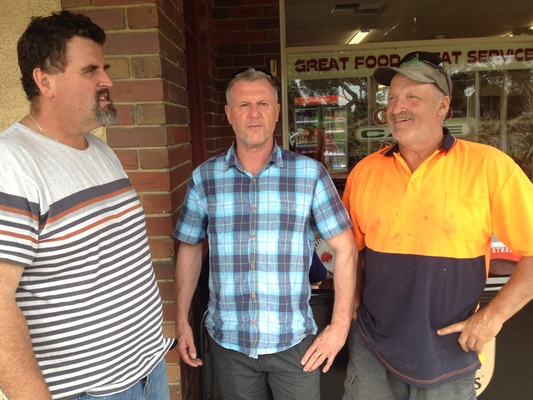By JOHN VAN KLAVEREN
They are Geelong’s forgotten workers who feel like they have fallen between the cracks.
While politicians trumpet multi-million dollar grants for Geelong companies to boost innovation, former Alcoa workers feel left in the lurch.
Three ex-Alcoa employees revealed their experiences to the Indy since the aluminium smelter closed in December.
Leopold’s Kel Brewer, 54, Corio’s Brett Noonan, 54, and Lovely Banks’ Garry Holmyard, 57, each spent many years at the 50-year-old plant.
“We’ve struggled since Point Henry closed,” Kel said.
“We’ve all struggled.”
The three recognised that the face of Geelong’s workforce was changing but rued being left behind in a transitioning economy.
Only one, Gary, had ongoing work – as a casual brick cleaner for Simonds Homes.
Kel had found occasional casual work but Brett, still dealing with injuries he said were a legacy of his tough work at Point Henry, had remained jobless.
“We’re not the only ones,” Brett said.
“We still talk to a lot of mates from Alcoa. A lot of them are just sitting at home getting depressed.”
The three agreed that replacing full-time work with courses was not enough.
“I’ve done lots of courses but lots of other blokes are all doing the same thing,” Kel pointed out.
“Everyone from Alcoa is doing the same thing because that’s all that’s available.
“But I haven’t studied for years and I admit I struggled with it.”
Kel said he studied two courses since the plant closed, one in horticulture and another in civil construction.
Many other workers had completed a traffic-management course, he said.
“There are all sorts of courses but no work. There are only casual jobs available and we’re all going for the same jobs.
“I know there are new jobs being created but those jobs are not for us.”
“We’re too old and too injured,” Brett said.
“As soon as you walk into an interview and they find out you’re injured or old you’ve got no chance.”
Redundancy payouts could never cover the cost of being jobless, Brett said.
“We stayed the course and, yes, we got a package but being denied work really gets you down.
“The younger ones lined up jobs and left before the closure, so they missed the package but they have a job. We had to stay to keep the package.
“Ford workers can get the package any time, even if they leave to go to another job. They get time off for training.
“We missed out on that.”
Brett said taking time to study in the hope of finding a new career was sometimes counterproductive.
“By time you finished the courses you’re out of work for a year.”
The trio estimated that 20 per cent of ex-Alcoa workers had found full-time jobs, up to 60 per cent had either a little casual work or nothing and the rest had given up or retired.
“We just want to feel worthwhile, be part of something,” Garry said.
“Being at Alcoa, especially the shift workers, was a big part of our social life and that has all gone.
“We just want to raise some awareness of what’s happening so people can learn from it.”







